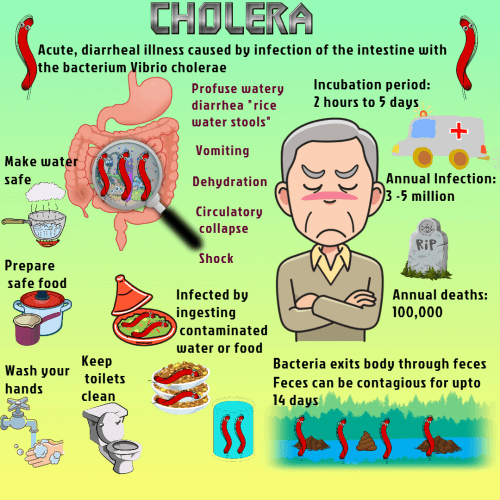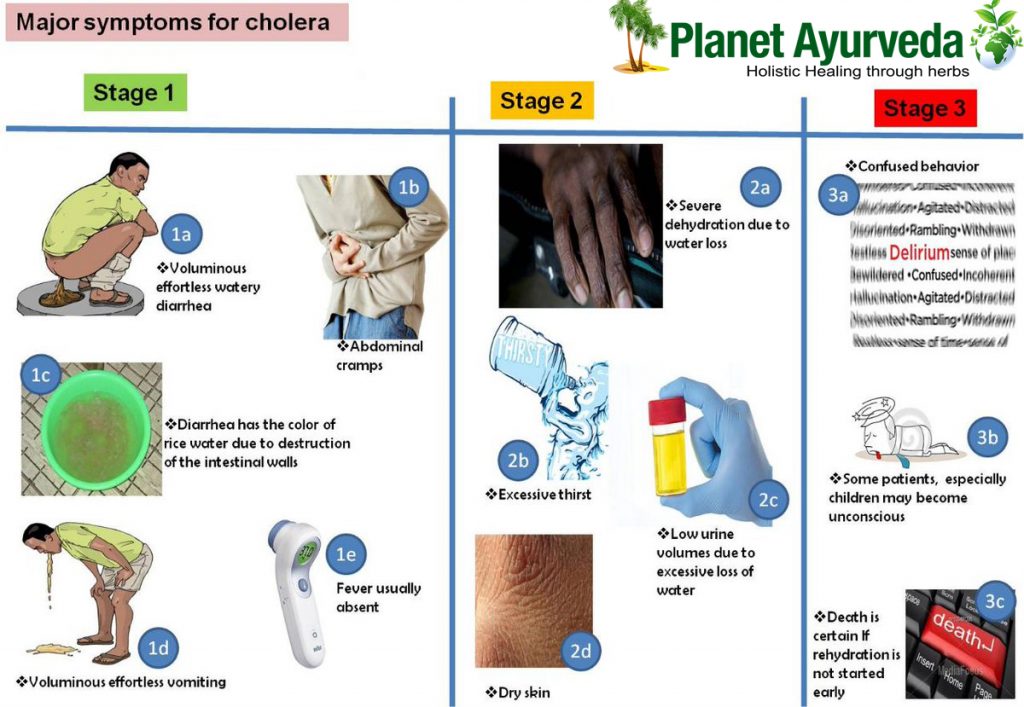What steps can you take to prevent cholera?
Cholera is an infectious disease that causes severe diarrhoea, which can lead to dehydration and even death if goes untreated. It is caused by eating food and drinking water contaminated with a bacterium called Vibrio cholerae.
The disease is most common in places with poor sanitation, war, overcrowding and famine. Common locations include parts of South Asia,, and Latin America.

What are the Causes of cholera:
VIBRIO CHOLERAE, the bacterium that causes cholera, is usually found in food or water contaminated by feces from a person with the infection.
Common sources include :
- Municipal water supplies
- Ice made from municipal watertight
- Foods and drinks sold by street vendors
- Vegetables are grown with water containing human wastes
- Raw or uncooked fish and seafood caught in waters polluted with sewage.
When a person consumes the infected water or food, the bacteria enters in the body and release a toxin in the intestines that produces severe diarrhoea. Cholera is characterized in its most severe form by a sudden onset of acute watery diarrhoea that can lead to death by severe dehydration. Cholera is an extremely virulent disease that affects both children and adults.

What are the Signs and symptoms of of cholera?
The signs and symptoms of cholera can begin as soon as a few hours or as long as five days after infection. Infection can be mild or severe. Sudden onset of painless, profuse and watery diarrhoea
- Nausea and vomiting and dehydration
- Fever is rare
- Kussmaul breathing (deep and laboured breathing)
- Low blood pressure
- Muscles cramps and weakness
- Alters consciousness
- Seizures
- Even coma due to electrolyte imbalances
TRANSMISSION:
- Fecal-oral route
- Direct person to person
INCUBATION PERIOD :
- Usually 2 to 3 days, but symptoms appear in a few hours to 5 days
INFECTIOUS PERIODS:
- During the initial stage of disease the person is infectious.. However, some people who do not have symptoms may still carry the bacteria and be infectious, sometimes for a month to years.
DIAGNOSIS:
Diagnosis is based on:
- Clinical signs
- Fecal specimen
- Dipstick test
PREVENTION:
The WORLD HEALTH ORGANIZATION (WHO) focuses on prevention, preparation, and response to the spread of cholera. They also stress the importance of effective surveillance.
STERILIZATION:
- Proper disposal and treatment of all materials that may have come in contact with cholera patient feces.
- These should be sanitized by washing in hot water using chlorine bleach.
SEWAGE AND FECAL SLUDGE MANAGEMENT:
- Sewage and fecal sludge need to be treated and managed carefully in order to stop the spread of this disease via human excreta.
- The provision of sanitation and hygiene is an important preventative measure.
WATER PURIFICATION:
- Washing, drinking or cooking water should be sterilized by either chlorination, ozone water, ultraviolet light, and boiling or antimicrobial filtration in any area where cholera may be present.
- Boiling and chlorination are the least expensive and most effective. Hand washing with soap or ash after using a toilet and before handling food or eating is also recommended for cholera prevention.
SURVEILLANCE:
- Surveillance and prompt reporting allow for controlling cholera epidemics rapidly.
- Cholera exists as a seasonal disease in many endemic countries, occurring annually, mostly during rainy seasons.
VACCINE :
- A number of effective oral vaccines for cholera are available.
Who has three prequalified oral cholera vaccines
- Dukoral
- Sanchol
- Euvichol
Inactivated whole cell vaccine, has an overall efficiency of about 52 % during the first year after being given and 62% in the second year, with a minimal side effect.
One injectable vaccine was found to be effective for two or three years. The protective effectivity was 28% lower in children less than 5 years old.
Severely ill patients should be isolated in a hospital.
When travelling to high-risk countries, seek advice from a travel medical clinic or an experienced general practitioner on how to protect yourself from cholera.
What are the Treatment of of cholera:
- Anyone who has been in the high-risk region within the previous 5 days and develops severe vomiting and diarrhoea should seek urgent medical assessment.
- Cholera can be easily treated by immediate rehydration, that is, replacement of the fluid and salts lost during diarrhoea.
- Oral rehydration fluid is recommended.
- Hospitalization and intravenous fluid replacement is required in severe cases.
- Antibiotics shorten the duration of illness and lessen the severity.
What are the Herbal Remedies for Cholera
PLANET AYURVEDA provides herbal remedies for the treatment of cholera. These are free from side effects, chemicals or preservatives. Planet Ayurveda provides herbal remedies like Digestive support, Kutajghan Vati, Vatsakadi churn and Pitta balance for Ayurvedic treatment of cholera.
1.DIGESTIVE SUPPORT :
- Digestive support is the remedy formulated from herbs like Amla, Haritaki, Bahera, Sounf, Dhania, Pippali, Jeerak.
- These herbs improve the working of the digestive system. The problem of cholera is to the digestive system. These herbal remedies can help the patient to get rid of poor digestion. So these herbs are considered really helpful to get rid of the cholera.
DOSE: One or two capsules twice daily
2.KUTAJ GHAN VATI :
- This Ayurvedic medicine helps in treating the problem of diarrhea,dysentery, bleeding disorders and intestinal problems.
- Herbs Kutaj and Ativisha are used in to make this remedy.
- This herbal remedy also helps in curing loose stools and enhances the absorption of nutrients in the body.
- This Ayurvedic medicine has been known since ages to cure the problem of abdominal pain, chills, fever, vomiting, nausea, pus and mucus.
- This herbal remedy is also helpful for other life-threatening diseases such as ulcerative colitis and rectal bleeding.
DOSE: two to three tablets thrice a day
3.VATSAKADI CHURNA :
- This churna is especially known for its anti-dysentery properties.
- The six major herbs namely Saunf, Anar, dhania, Bilva, Chhoti Elaichi, and Jaiphal are mixed.The pure extracts of these herbs have many such properties that help to get rid of problems like cholera and dehydration.
- This churna helps to regulate the digestive system and ensures proper functioning.
Dose: 1 or 2 teaspoons with plain water after a meal on a daily basis
4.PITTA BALANCE :
- This is an herbal remedy that helps to balance the Pitta Dosha. This controls the burning sensation and inflammation, which are also another cause of chest pain.
- This herbal remedy is rich in natural calcium that helps in repairing of injured bones.
- This will provide strength to the body and help to fight weakness that arises due to dehydration.
- This herbal remedy is formulated with a blend of many herbs such as Praval Pishti, Jahar Mohra Pishti, Kamdudsha ras, Mujta Pishti, Akik Pishti, and Giloy Satva.
DOSE: 1 capsule one time or two times a day

